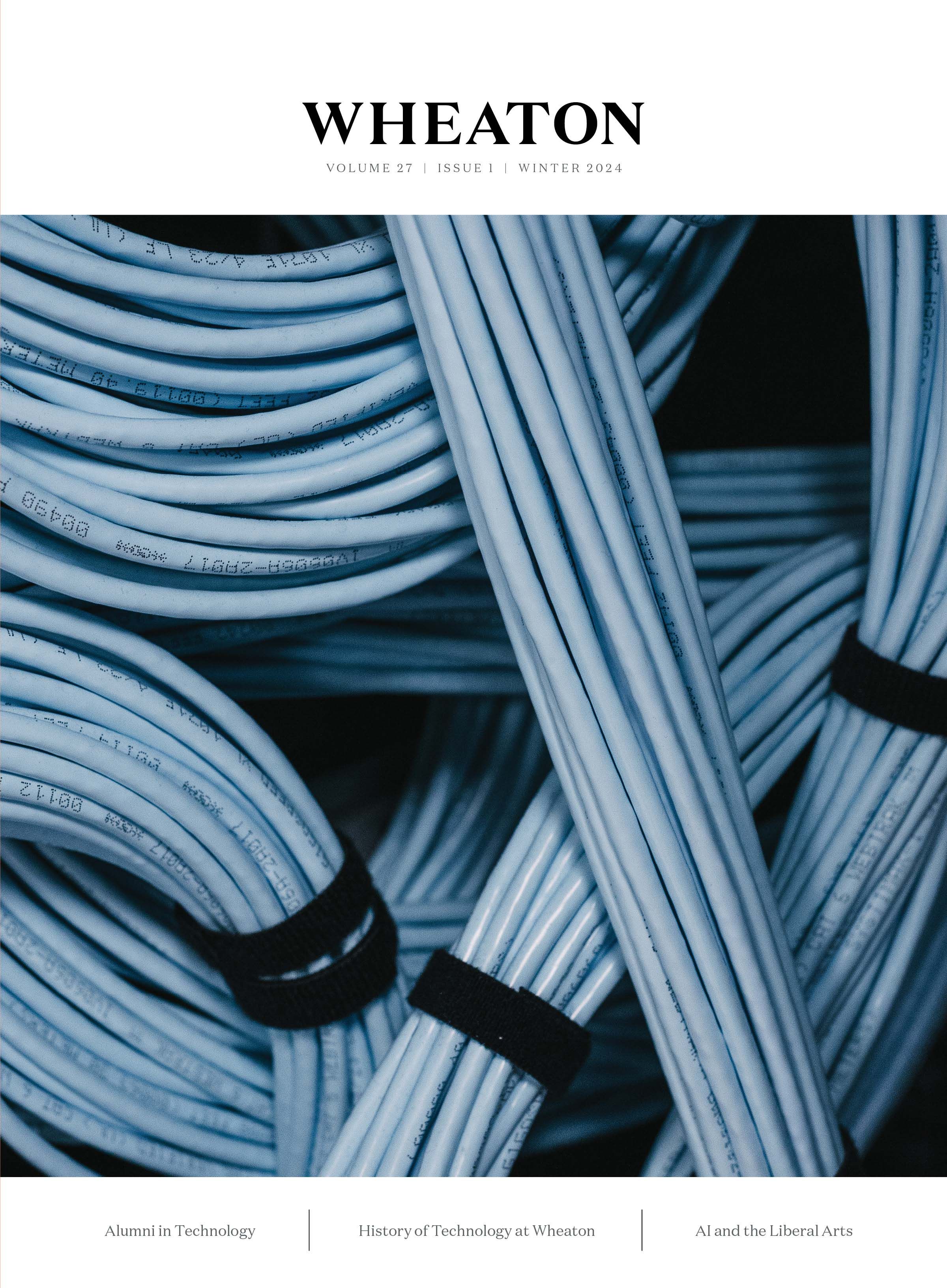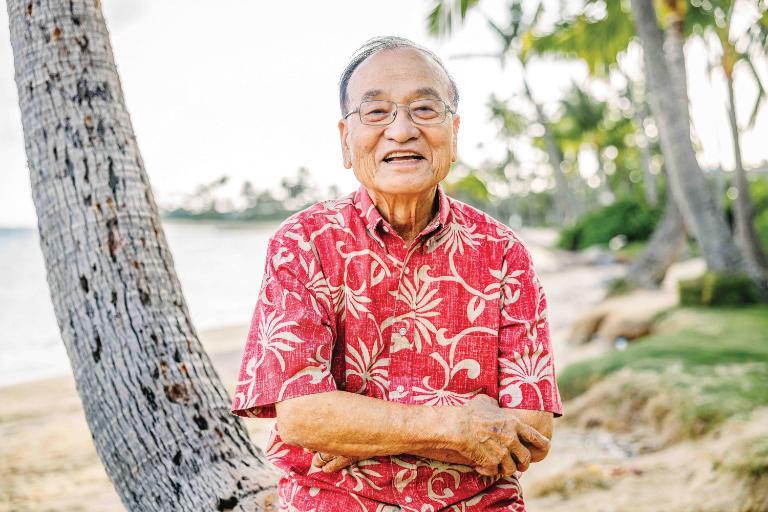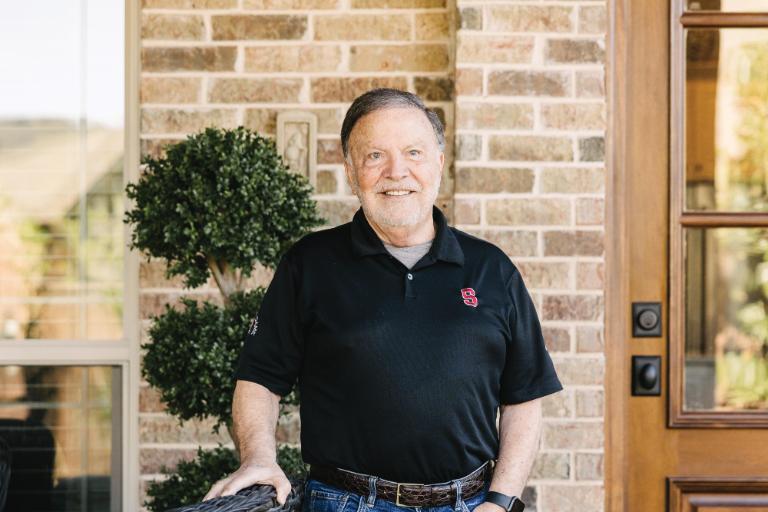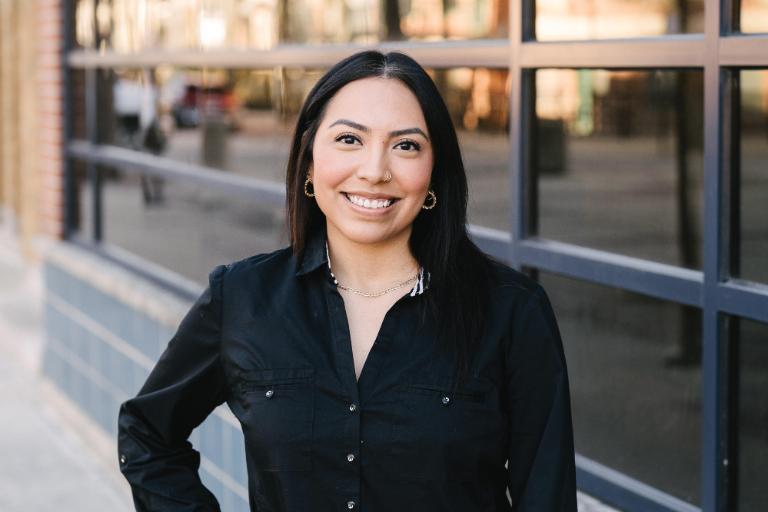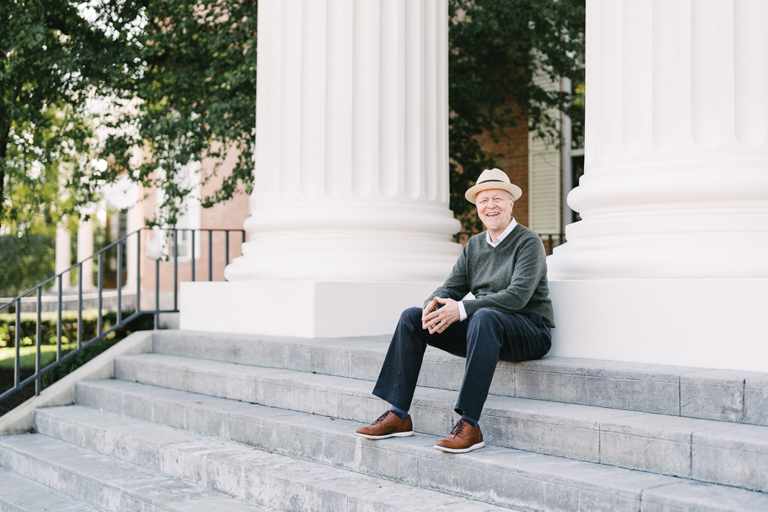Dr. Scott Moreau ’77
For over three decades of championing the Wheaton College Graduate School and empowering faculty and students through pedagogical innovations and relational bridge-building, the Wheaton College Alumni Association names Dr. Scott Moreau the 2023 Alumnus of the Year for Distinguished Service to Alma Mater.
Words: Eliana Chow ’21
Photos: Tony Hughes
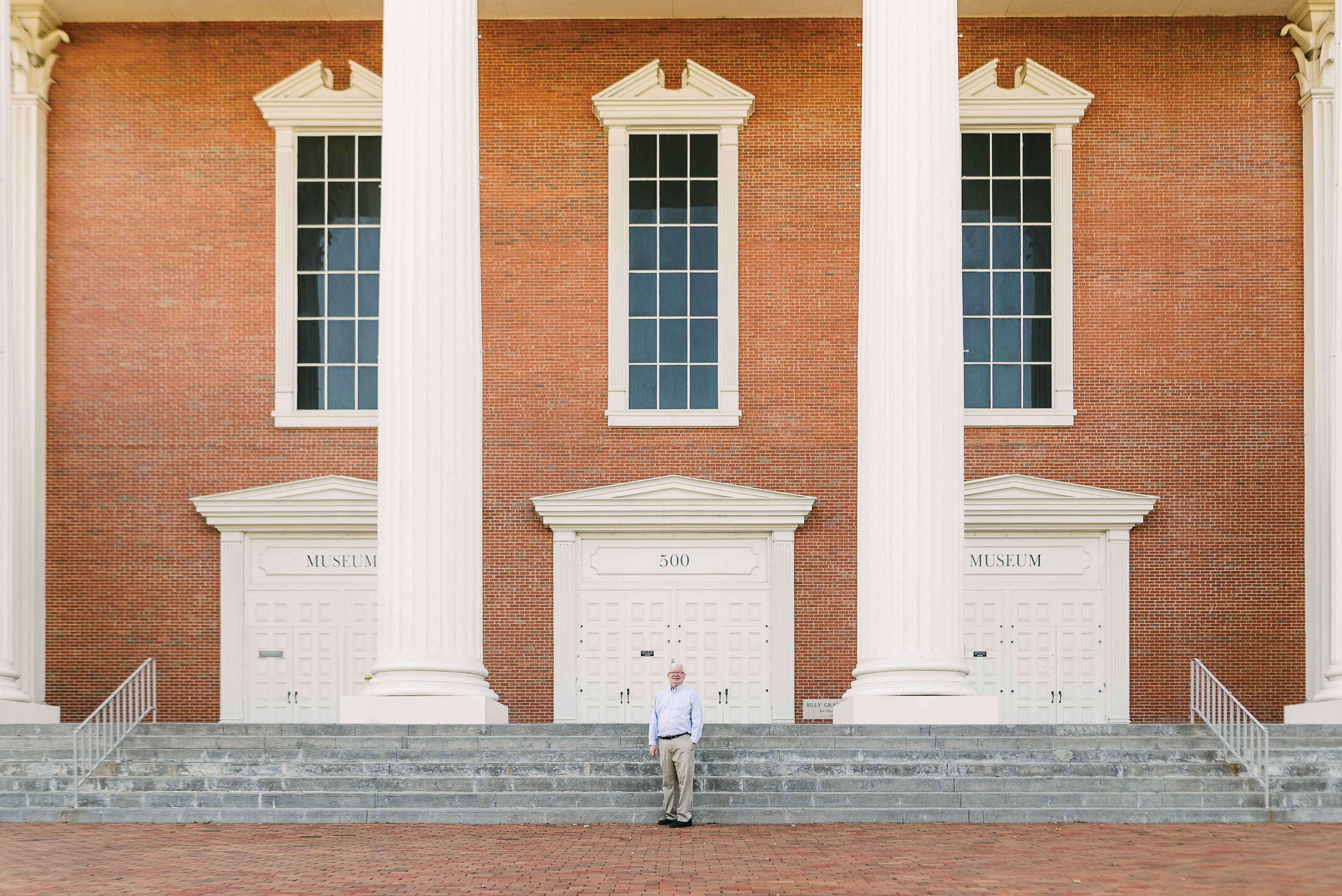
Dr. Scott Moreau ’77 in front of Billy Graham Hall, home of the Wheaton College Graduate School where he served for 32 years.
When Dr. Scott Moreau ’77 was a sophomore at the University of Illinois Urbana-Champaign, he attended what he thought would be a routine prayer meeting at a local church.
“Suddenly, I wasn’t at the prayer meeting anymore,” he said. “Instead, I was standing before the Lord, and he asked me, ‘What are you going to do with your electrical engineering degree?’”
Although he now recognizes how any career presents an opportunity for ministry and evangelism, younger Moreau could only sit speechless. At the time, he didn’t necessarily see his engineering trajectory in terms of ministry.
“That’s right,” Moreau recalled the Holy Spirit telling him. “It’s time to move on.”
Moreau believes that was the moment God called him into full-time ministry. It was the first of several providential pivots that would come to mark Moreau’s lifelong career in ministry and teaching, ultimately leading him to contribute decades of service to Wheaton College. He was a 20-year-old college student aiming for a stable career in engineering, and God was asking him to reroute. Moreau couldn’t ignore that voice. After looking into several Christian colleges, he transferred to Wheaton for his junior year in 1975, committing to a physics degree and the gymnastics team while he tried to figure out what ministry service would look like for him.
It was something akin to culture shock transferring from a large public institution to a small Christian college. Everything Moreau did at a secular school came with a missional lens, but at Wheaton, everything was already assumed to be Christian, which posed its own confusing adjustment. Nonetheless, he persevered and began exploring how to combine his passion for science with this newfound call. God moved powerfully, and Moreau followed.
A Chapel talk on the need for science and math teachers in Nigeria. An opportunity to tutor international students in physics. Just enough money to attend Urbana ’76. What some may call coincidence, Moreau identified as the Lord’s leading. When he graduated in 1977, he accepted an offer to be on Cru staff full-time, packed up his life, and moved to Eswatini (formerly Swaziland).
Moreau worked with Cru for the next 14 years, ten of them in Africa. He taught and served in administrative leadership roles in schools, accreditation committees, and council boards throughout Eswatini and Kenya. In 1980, he temporarily returned to the U.S. to complete his M.Div. and D.Miss. with Trinity Evangelical Divinity School before resuming his roles in southern Africa.
As the decade turned over, Moreau’s wife, who was an administrator in Kenya, proposed a permanent move back to the States. Moreau was reluctant. “I had thought Africa was a lifetime commitment for me,” he said. “For 18 months, my wife and I prayed the Lord would unify our desires. Finally, I felt my heart release from Africa and toward the U.S.”
Around that 18-month mark, Moreau attended a conference in Kenya for theological educators, where his path intersected with Dr. Jim Plueddemann, then a professor at Wheaton (and later a trustee), who had also left Africa after serving as a missionary there for 13 years. Plueddemann encouraged Moreau to apply for an open faculty position at Wheaton.
The transition to teaching in the graduate school of his alma mater had its hurdles. “It was a divine coincidence that I came back here,” Moreau said. He was hired with only a one-year contract. After the dependability of Cru, the uncertainty necessitated a leap of faith. Yet for all his hesitations, he trusted God had work for him to accomplish and people to serve at Wheaton. Together with his wife and children, Moreau made the move to Wheaton. He stayed for 32 years.
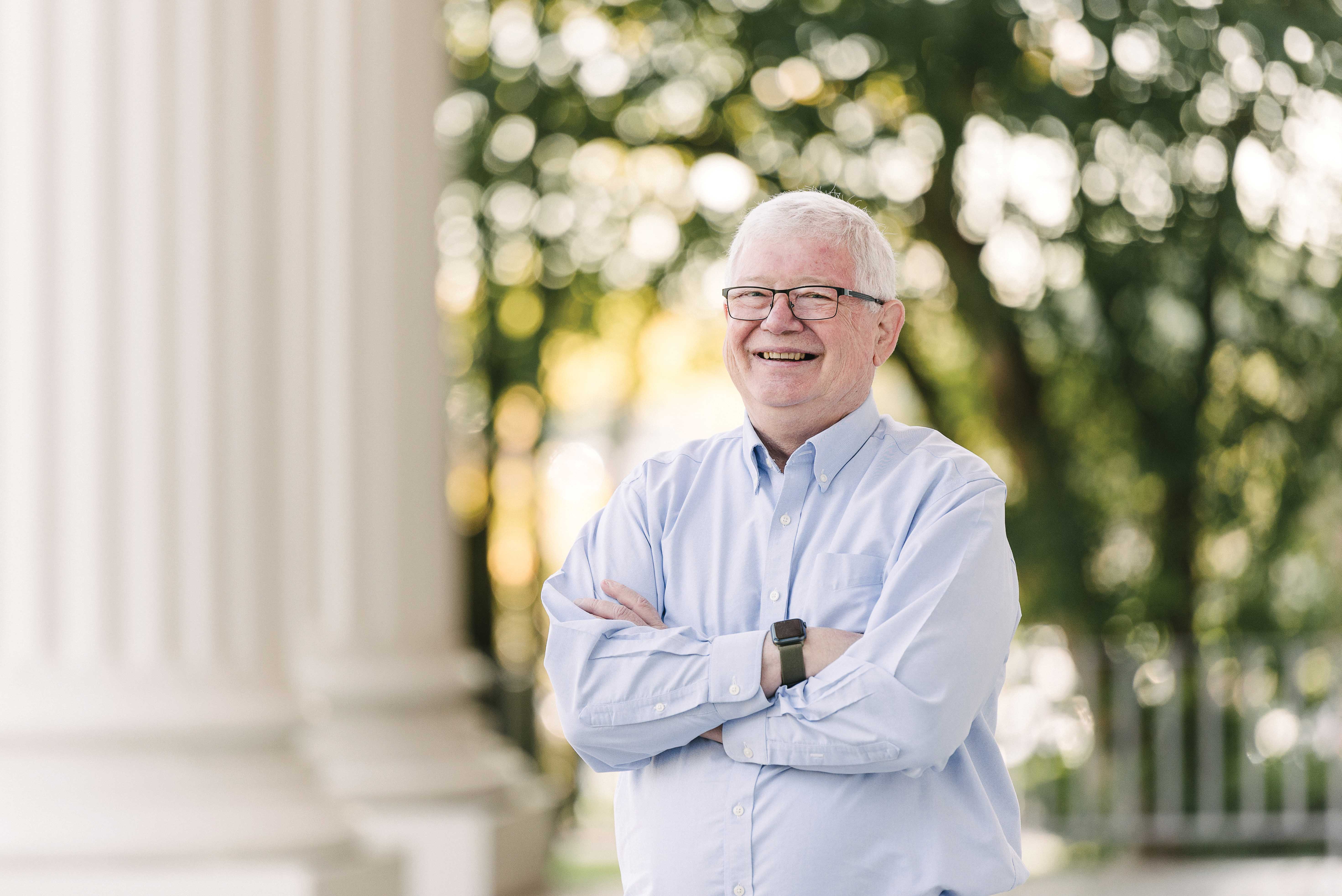
Dr. Scott Moreau ’77, Alumnus of the Year for Distinguished Service to Alma Mater
Moreau worked in the Wheaton College Graduate School in a variety of roles, though cross-cultural communication and contextualization remained his primary focus. He was tenured in 1998 and went on to serve in several administrative roles within the intercultural studies department and over the Graduate School as a whole.
As associate dean, Moreau played an integral role in establishing the Graduate Council, a body of Graduate School faculty and staff responsible for governance and curriculum efforts that are separate from undergraduate decision-making. He was also deeply involved, with then-Dean Nick Perrin and fellow graduate faculty, in developing fresh mission and vision statements for the Graduate School that emphasized the needs of an increasingly global student body.
“As a world-class scholar and global authority on cross-cultural mission, Scott Moreau was a force for transformation at Wheaton College,” said President Philip Ryken ’88.
“As he saw opportunities for the Graduate School to expand its educational reach for Christ and his kingdom, he carried them out with a clear commitment to his esteemed colleagues and his beloved students from around the world.”
The new structure was groundbreaking. Previously, changes in the Graduate School had to be approved by an undergraduate committee, which was less efficient. “The new vision allowed us to be more nimble and adapt to the needs of our students,” said Moreau. “The change also helped us propose programs, develop and offer new degrees and certificates, and start shifting to the online world.”
Although Wheaton’s undergraduate programs are residential, many of its graduate students serve in contexts worldwide. The early 2000s introduced a shift in student demographics among those interested in studying at the Graduate School—moving from American students with some cross-cultural experience to largely second-career individuals and international students. With his colleagues, Moreau recognized the opportunity to offer Wheaton’s graduate education to mid-career individuals who may not be able to leave their contexts for a full-time residential program.
“I always appreciated how Scott championed our identity as a global institution serving global partners,” said Professor of Psychology Dr. Terri Watson, former Dean of Psychology, Counseling & Family Therapy. “Wheaton attracts international students from around the world, and Scott was focused on how we could provide courses that were more accommodating to their contexts and distance learning needs.”
Throughout his tenure, Moreau brought a global lens to Wheaton and Wheaton to the world. Under his leadership, the Graduate School began offering flexible learning options for most master’s programs. Degrees can be earned via asynchronous coursework that learners complete from their home country, all taught by Wheaton faculty. Moreau also forged partnerships across Asia and Europe to host Graduate School faculty for in-person intensive classes with their remote students, giving learners an additional chance to connect with their professors and network with their peers.
The key to flexible learning is technology, and Moreau is a self-described geek when it comes to integrating technology with pedagogy. When the internet took off in the late 1990s, Moreau was one of the early faculty members from Wheaton to take courses at the University of Illinois on how to develop curricula conducive to online learning. Almost immediately, thanks to Moreau’s enterprising leadership, intercultural studies professors started incorporating distance learning into their courses. Eventually, the entire Graduate School was on board.
“We were one of the early precursors at Wheaton to the whole online environment,” Moreau said. “I loved it. I see both challenges and great opportunities for teaching with the internet.”
Naturally, when the campus closed for the early months of the pandemic in March 2020, college administrators turned to Moreau for guidance. He was tasked with mobilizing Wheaton faculty and staff to shift to remote work models. With decades of experience in adapting his pedagogy for technological and cultural differences, and a résumé filled with classes taught in online, residential, and hybrid environments, Moreau was the perfect fit to lead an educational shift that was, it turned out, not quite so unprecedented after all.
Watson speaks highly of Moreau’s character: a servant-hearted Christ-follower who never hesitated to step in where he saw a need. “Scott is completely trustworthy, humble, collaborative, and always inviting multiple perspectives to the table,” she said. “His thinking about Wheaton and our academic work always has the world and the Lord in mind.”
Dr. Karen Lee, who as provost has led the academic division and curriculum development at Wheaton since 2020, agrees. “I am grateful for Dr. Moreau’s interculturally astute leadership and his interpersonal ‘ministry of presence,’” said Lee. “He is a wellspring of encouragement, goodwill, and compassion to our colleagues and students—as well as a fountain of fun.”
If Moreau was an enabler of dreamers and an engineer of achievers on the administrative side of his work, he was even more committed to the relationships that operated within the systems he strove to improve. “The first thing that comes to mind is when the light bulbs turn on in their eyes,” he said, reflecting on the most rewarding aspects of his role as an educator. “They start sharing stories from their own lives. They make what I’m teaching come alive for themselves and for others in the classroom.”
The content Moreau teaches isn’t easy. Things can get vulnerable fast when discussing intercultural communication, requiring learners to be open to seeing the world through other perspectives and acknowledge their own limitations, each with unique contexts that inform their interpersonal understanding. Such training goes beyond informing future educators, too. Faculty interact with students from a variety of backgrounds and often travel for teaching and speaking engagements. Moreau participated in efforts at Wheaton to train current and future faculty in cross-cultural communication.
“Our international students are always amazing to me because the bulk of them are working in a second, third, or fourth language,” he said. “It’s fun to debrief after class and hear from them—to see a mirror of myself in their eyes but in a way that makes me look strange. I really appreciate listening to them, growing from them, and hearing their stories that I often use when I’m speaking and teaching in intercultural settings.”
In July 2023, Moreau formally retired from Wheaton College, though he retains a packed traveling schedule. Since then, he’s taught classes in Australia, Taiwan, and Thailand, continuing to meet and recruit graduate students for Wheaton. He sees it as continuing the work God called him to do all those years ago.
Moreau’s teaching and eye for change develop from the stories others entrust to him and the values he has personally lived out throughout his career, spanning the entire globe and yet, providentially, bringing him right to Wheaton’s doorstep.
